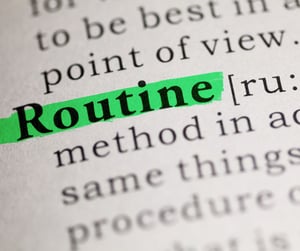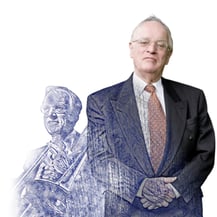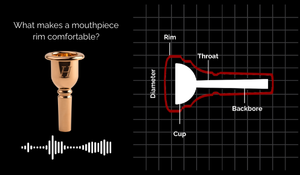Warming Up and Why: The Power of Routine


Whether as an educator or a performer, the idea of brass players warming up properly is both extremely important and tied to the idea of a regular practice routine. Here are some of the most important ideas to consider when developing or examining your own routine.
Enough is enough. From a physical standpoint, being warmed up simply means you have the muscular ability to play anything you need to without causing an injury. From a psychological standpoint though, it means believing that that is true. In my own playing career I have had times where I needed at least an hour to feel good, and others where 30 seconds had me ready to play a gig. My own physical development has something to do with this, but much more of it is the varied definition of “ready.”
When I needed an hour, I was in school double majoring in orchestral performance and jazz studies, marching drum corps, and playing gigs at night. In addition to being younger and less physically trained, this meant that when I warmed up I was probably still stiff from the night before and had to be ready for a long day of playing an incredible variety of music. On top of that, drum corps had me physically and mentally trained to expect a long gentle warm up followed by a lot of playing at extremes of volume and register. In contrast, by the time I was in grad school and even more so upon graduation my playing schedule was drastically different.
This meant I was fresher when I warmed up and had less stylistic variety to be ready for on any one performance; for instance, I didn’t need to work on multiple tonguing and transposition right before a big band gig any more than I needed to work on ii-V’s and upper register playing before playing 2nd cornet with a brass band.
The moral of the story is that while some things will need to be a part of any routine, others and especially stylistically specific techniques may or may not depending on your daily performance schedule. So how do you decide what you need to include?
Check your boxes. The first step to deciding what needs to be in your warm up is to figure out what you can’t skip; the concepts and elements that if you don’t play them, you just aren’t mentally or physically ready to perform. While this can vary greatly in terms of what kind of exercises and techniques, most successful routines include exercises that address the following concepts:
1. Breathing/Air - Am I moving air efficiently and with proper support?
2. Tone Production - Am I making the best sound I can on the instrument?
3. Articulation- Am I articulating with proper method and style?
4. Technical Facility - Am I able to move around the various registers and volumes of the instrument?
5. Music - Am I able to put all of these together to make music the way I need to today?
There are countless ways to address these areas, so more important than any specific exercise or method is if it answers the question for you. The last question of making music is the most important and is determined by how well you answer the first four, and as alluded to before it can mean very different things on different days. This is where a warm up routine differs from a practice routine; a warm up is about what you want to perform that day or that minute (micro) whereas a practice routine is about what you want to be able to play in the future (macro). That said, the process of creating a plan to achieve that goal is largely the same.
Be consistent. One of my best teachers once told me, “It matters more that you have a routine than what it is.” Even though routines can be extremely varied, consistent preparation results in consistent performance. While I may change my warm up depending on what I’m performing that day, I will still pick consistent exercises for whatever technique or concept I decide to include. Likewise, once I add something to my practice routine to improve at something specific, I have to leave that element in my routine and address it regularly if I want to achieve the goal. In other words, repetition is its own teacher as long as you let it do the work.

Find all our Denis Wick resources in one spot on the Denis Wick app. Download to view videos, clinics, educator resources, podcasts, product information & more!
To get the latest news and information from Denis Wick Products including offers, promotions and special deals with our retail partners please sign-up to our newsletter. We will never share your information.



